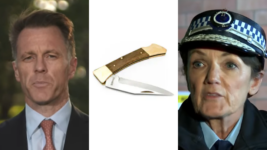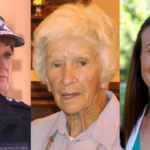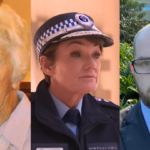Sydney Stabbings Highlight Need for Mental Health Reform, Not Tough-on-Crime Laws

Following the multiple stabbing murders in a Bondi Junction shopping mall last Saturday, and the stabbing assault of a western Sydney priest two nights later, the Minns government is now considering more tough-on-crime laws to prevent future knife attacks.
This kneejerk reaction is the normal response from both major parties in the state of NSW, tough-on-crime measures are persistently being funnelled through NSW parliament, and this continues while its benefit is doubtful when the underlying issue is that of mental health.
The official story is that the 40-year-old man who appeared to be targeting women, as he murdered six people in a Bondi mall, had long suffered mental health issues, and the 16-year-old who stabbed a priest nonfatally has been labelled a terrorist, despite the incident suggesting an unsound mind.
The violence that has transpired, however, is the type of behaviour that is impossible to predict and prevent from an enforcement perspective. And to contemplate societal change that could lead to less mental health issues within the community, isn’t the go-to response of the political class.
So, right now, NSW Labor is considering empowering police to run metal detecting wands over civilians in public without a warrant or any reasonable suspicion.
And the fact of the matter is, if tougher laws do prevent such incidents, then why didn’t the beefing up of the penalties applying to knife crimes enacted mid-last year, not prevent current incidents?
Crackdown on sharp objects
“We increased knife laws about six months ago… but I am not prepared to rule that out right now. Obviously where people have been killed, and you’ve got a situation where a knife is used, then nah, it would be irresponsible not to look at it,” NSW premier Chris Minns told 2GB’s Ben Fordham.
NSW ministers of either creed have, over recent years, made a habit of appearing on 2GB radio station to initially spruik new laws live in response to public incidents.
Indeed, if one takes what transpires on-air seriously, the imposition of the 2022 NSW antiprotest regime was Fordham’s idea.
And NSW police minister Yasmin Catley has confirmed that more knife laws are being considered, while Queensland man Brett Beasley told the ABC that he last year suggested wanding be enacted in NSW, which is known as Jack’s Law in his state, in memory of his son who was killed by a knife.
Jack’s Law was passed by Queensland parliament in March 2023, and it “allows police officers to utilise a metal detecting wand in operations in all Safe Night Precincts”, areas now given extra late-night police attention, along with “public transit hubs and on public transport”.
According to the Queensland Police Service, the first eight months of “wanding operations”, saw more than “3,400 handheld scan operations” conducted, which led to 39,000 people being randomly searched in this manner, resulting in the charging of 1,070, which related to almost 1,900 charges.
Under the new regime, Queensland police has been able to seize all manner of kitchen utensils and everyday garden shed implements from the general public.
However, it’s highly likely all these “offenders” were able to secure such implements elsewhere if they needed to, perhaps at the local mall or when they got home.
The approach is all wrong
Prior to the completion of an official inquiry into weapons laws, which had knives on its agenda, the Minns government passed knife crime legislation mid-last year, which turned the minor offences of possessing or displaying a knife in public or a school into serious crimes carrying four years gaol time.
But it’s unclear how this could have prevented either of the recent knifings in Sydney, as the deterrent for carrying a knife is hardly going to stop a person who is considering taking the life of another using a knife, as this carries much more severe penalties.
The knife laws also passed at a time when the issue of having NSW police officers continuing to act as first responders to citizens who are having mental health crises was being debated, after two civilians wielding knives had recently either been fatally tasered or shot dead by police.
Prior to the shooting of Cauchi last Saturday by a NSW police officer, at least five people having mental health episodes had either been shot or tasered to death by police since last May, and rights groups, progressive politicians and lawyers have all been crying out for another approach.
So, the question is, if people are regularly having dangerous mental health crises in public, and police are killing them, wouldn’t it be a better to invest in mental health programs and to deploy professionals other than police to crises, in order to stop lethal force being used as a solution?
An authoritarian future
In the centre of downtown Jakarta, there are two grandiose shopping malls opposite each other at a major intersection. And the striking thing for a visitor from Australia is that in order to enter these buildings containing shops, one has to pass through security as heavy as going through customs.
The reasons for such security measures, one understands as their bags are X-rayed and they pass through a metal detection archway, is to prevent people from entering with weapons, such as guns and explosive devices, and likely knives as well, in order to prevent violence inside.
Yet, the idea of such a scenario existing in Sydney is abhorrent to many, especially as on entering those malls, it’s apparent that a class distinction is being made to inform entry as well.
But the Bondi Junction shopping mall stabbing of last weekend is now leading to proposals that are generally heading the state into a similar direction as the Indonesian capital.
And one only has to consider that over the last two decades, the NSW Police Force has incrementally inserted drug detection dogs into public places, in a manner similar to the wand proposal, and further, over the last decade, law enforcement has normalised the strip searching of civilians as well.
Similar to wanding, the NSW police drug dog program has long been criticised over its random warrantless searching of the public without any required reasonable suspicion, which can now lead to a person being ordered to take all their clothes off if nothing is found.
The canines, however, are notorious for indicating people who aren’t in possession of anything illegal most of the time, and this then leads to innocent individuals being singled out for an ultimate strip search, after an officer applies a pat down to no avail.
This didn’t happen in the 1990s, and it made for a much more cohesive society.
And perhaps the most symbolic representation of how the state’s habit of continually enhancing policing powers is detrimental to us all, was when police placed screens at Central Railway Station in 2019, in order to provide commuters they choose to strip search at the station with some privacy.







